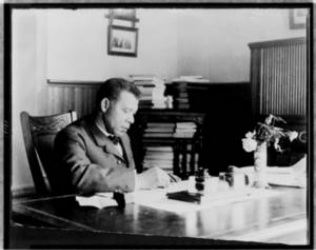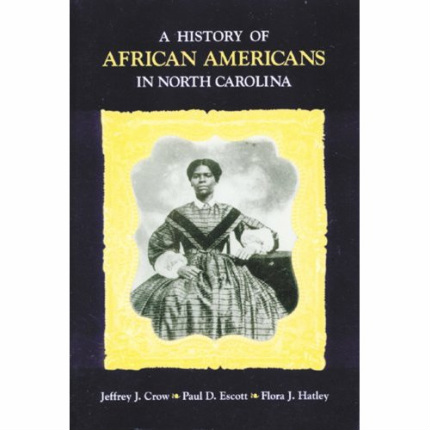Reconstruction
At the turn of the century, the North Carolina general assembly began taxing for education to collect matching funds from a Literary Fund. The Freedman’s Bureau had spent $5 million for education of slaves between 1865 and 1868 (Hanchett, 1988). Industrial schools and colleges were set up with philanthropic and church organizations (Franklin, 2000). Teachers taught basic scholastic and survival skills. Teachers gave lessons in sewing and canning foods raised in the garden. (UNC Southern Oral History Program, 2005).
During Reconstruction in North Carolina, Republicans and recently freed slaves were elected and set up a system of public schools. The Rev. J.W. Hood helped write the N.C. Constitution in 1868 and served as assistant superintendent of education (Crow, Escott, & Hatley, A History of African-Americans in North Carolina, 1992). Hood, among other things, was assistant superintendent of the Freedman’s Bureaus. He established Livingstone College in Salisbury, and was a leader in the African Methodist Episcopal Zion Church. (Bell, n.d.).
In 1870, Conservative/Democrats regained control of the legislature (Christensen, 2011). Freedoms and education for freed slaves eroded as Ku Klux Klansmen harassed and threatened advocates for African Americans. "Nightriders burned many of the schoolhouses built by former slaves and poor whites for whom education had become an important symbol of democratic aspirations," Timothy Tyson writes in Radio Free Dixie (Tyson, 1999, p. 13). Leaders who supported Klansmen disenfranchised former freemen who were not educated and enacted Jim Crow laws. As long as former slaves were not educated, they were unable to vote and the elite white remained in power (Franklin, 2000).
An education leader assuages fears with logic

(Photo from [url=http://www.clipartguide.com/_pages/0512-0711-1512-3851}
Political power was not the main concern of a former slave, Booker T. Washington, an educator who took action. He spoke for the need to train former slaves to earn a living in order to survive. He had learned to read and write in spite of legal prohibitions. He was educated at Hampton Normal and Agricultural School, Va. He was asked to teach. Then, Brigadier General Samuel Armstrong, Superintendent of the Freedman’s Bureau, recommended him for setting up an industrial school in Tuskegee, Ala. Washington built the Tuskegee Institute from the ground up (Washington, 1902). As he connected with the community and abroad to raise funds for the college, he developed a capitalist’s point of view about why all in society, white and black, would benefit from the education of former slaves. He wrote and spoke eloquently about how people raise themselves highest when they are lifting up others (Carroll, 2006, p. 94). His pragmatic ideas earned him an invitation to speak at the convention of cotton industrialists, the Atlanta Exposition. His speech gained nationwide attention for his practical ideas and appeal to members of both races to work for the mutual benefit of all. He advised presidents on resolving the problem of educating former slaves.
His autobiography, Up From Slavery, influenced a successful businessman of a family from Germany, a country that also had been divided by civil war in the late 1800s. The businessman Julius Rosenwald had made his fortune in the retail catalog business as president of Sears, Roebuck and Company. He was sympathetic to the plight of the minority. Rosenwald was sympathetic to the Washington’s effort to solicit funds for educating African Americans. In 1912, Rosenwald gave $25,000 toward Washington’s Tuskegee Institute.
Then, Washington persuaded the millionaire to help build elementary schools in surrounding areas with community support. philanthropist established the Julius Rosenwald Fund, with the goal to build schools collaboratively with communities, in order to build lasting cooperation between the races. Communities would receive funds only with matching monies, work or land from both races. Success of the first schools in three states was duplicated across the country, including Union County, North Carolina. The effects of the schools on the economic well-being of Southern blacks was an increase in income of 35 percent in comparison to whites, according to a report published by the Federal Reserve Bank of Chicago in 2009. (Aaronson & and Mazumder, 2009).
Washington’s promotion of technical education for the African Americans was criticized by his younger counterpart W.E.B Du Bois, who had been educated in the north as a minority student at Harvard University and later in Europe (DeMarco, 1983). Du Bois was publisher of a newspaper for the NAACP and later presided over the Atlanta Conference. Du Bois’ view was that African Americans should focus on educating a few leaders in letters to lead politically in order to achieve social equality rather than the teaching the common man a trade for an economic foundation (Du Bois, 1968).
Today, arguments may support both technical and general education. The effects of the schools on the economic well-being of Southern blacks was an increase in income of 35 percent in comparison to whites, according to a report published by the Federal Reserve Bank of Chicago in 2009. (Aaronson & Mazumder, The Impact of Rosenwald Schools on Black Achievement., 2009). Several generations of African-Americans have studied at universities that arose from Washington’s efforts to establish universities and Du Bois’ work to further access in the white institutions. About a century later, their work culminated in the election of Barrack Obama as president of the United States, a leader educated in letters, as Du Bois might have described.
His autobiography, Up From Slavery, influenced a successful businessman of a family from Germany, a country that also had been divided by civil war in the late 1800s. The businessman Julius Rosenwald had made his fortune in the retail catalog business as president of Sears, Roebuck and Company. He was sympathetic to the plight of the minority. Rosenwald was sympathetic to the Washington’s effort to solicit funds for educating African Americans. In 1912, Rosenwald gave $25,000 toward Washington’s Tuskegee Institute.
Then, Washington persuaded the millionaire to help build elementary schools in surrounding areas with community support. philanthropist established the Julius Rosenwald Fund, with the goal to build schools collaboratively with communities, in order to build lasting cooperation between the races. Communities would receive funds only with matching monies, work or land from both races. Success of the first schools in three states was duplicated across the country, including Union County, North Carolina. The effects of the schools on the economic well-being of Southern blacks was an increase in income of 35 percent in comparison to whites, according to a report published by the Federal Reserve Bank of Chicago in 2009. (Aaronson & and Mazumder, 2009).
Washington’s promotion of technical education for the African Americans was criticized by his younger counterpart W.E.B Du Bois, who had been educated in the north as a minority student at Harvard University and later in Europe (DeMarco, 1983). Du Bois was publisher of a newspaper for the NAACP and later presided over the Atlanta Conference. Du Bois’ view was that African Americans should focus on educating a few leaders in letters to lead politically in order to achieve social equality rather than the teaching the common man a trade for an economic foundation (Du Bois, 1968).
Today, arguments may support both technical and general education. The effects of the schools on the economic well-being of Southern blacks was an increase in income of 35 percent in comparison to whites, according to a report published by the Federal Reserve Bank of Chicago in 2009. (Aaronson & Mazumder, The Impact of Rosenwald Schools on Black Achievement., 2009). Several generations of African-Americans have studied at universities that arose from Washington’s efforts to establish universities and Du Bois’ work to further access in the white institutions. About a century later, their work culminated in the election of Barrack Obama as president of the United States, a leader educated in letters, as Du Bois might have described.

